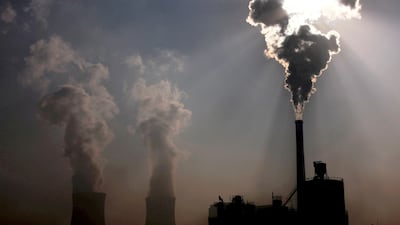Several members of the Organisation for Economic Co-operation and Development, including Britain, the EU and the US, have agreed to stop providing export credits for coal-fired power plants, the body announced on Friday.
The ban will halt financial support to new coal power stations that do not have systems that trap carbon emissions responsible for global warming, the Paris-based organisation said.
“The ban will come into effect once participants complete their formal internal decision-making processes, which are expected by the end of October,” the OECD said.
The decision comes about a week before the Cop26 climate conference in Glasgow, Scotland, which starts on October 31.
Other countries participating in the ban are Australia, Canada, Japan, South Korea, New Zealand, Norway, Switzerland and Turkey.
It covers new coal-fired power plants without operational carbon capture, utilisation and storage. For existing coal-fired power stations, the credits can only be used for pollution mitigation and carbon capture equipment that does not extend the service life of the plant.
Coal, considered the dirtiest fossil fuel, is responsible for a major chunk of global carbon emissions.
While many developed nations have tried to reduce coal in their domestic power mixes to meet ambitious new climate pledges, they have often continued to finance coal projects abroad, drawing criticism from environmental groups.
Export credits refer to government financial support, such as direct financing, guarantees, insurance or interest rate support, provided to foreign buyers to assist in the financing of the purchase of goods from national exporters.
In May, G7 environment ministers agreed to stop the direct funding of coal-fired power stations in poorer nations by the end of this year
Then in July, Cop26 President Alok Sharma urged developed nations to end the use of “unabated” coal power to reach their climate change objectives.
In an address to the G20 Climate and Energy meeting in Naples, Mr Sharma said that the use of the fuel is “incompatible” with limiting global temperature rises to 1.5C compared with pre-industrial levels by 2050, as set out in the 2015 Paris climate deal. However, an agreement on the topic was not reached.
Coal use is regarded as unabated when it is burnt for power or heat without utilising technology to capture the ensuing emissions – a system not yet widely used in power generation.
The G20 countries are responsible for almost 80 per cent of global emissions and 85 per cent of the global economy, Mr Sharma said.


